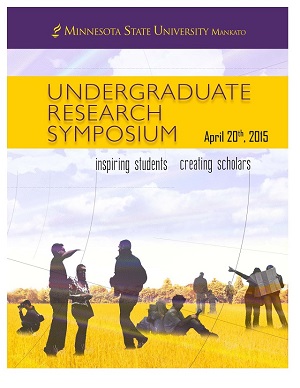Can Student Attention Predict Learning? Investigating the Relationship between Sustained Attention and the Testing Effect
Location
CSU 254
Start Date
20-4-2015 2:10 PM
End Date
20-4-2015 3:10 PM
Student's Major
Psychology
Student's College
Social and Behavioral Sciences
Mentor's Name
Karla Lassonde
Mentor's Email Address
karla.lassonde@mnsu.edu
Mentor's Department
Psychology
Mentor's College
Social and Behavioral Sciences
Description
Attention and memory are essential for academic success; however, there are many classroom circumstances in which it is clear that students have difficulty paying attention. Our goal was to examine the role of sustained attention on memory for test items. Research on testing has revealed the Testing Effect phenomenon, which has shown positive effects on long-term retention through repeated-testing. We examined whether or not an individual’s ability to sustain attention would influence these known benefits. The Sustained Attention to Response Task (SART; a go/ no-go task) was utilized to measure participants’ ability to pay attention. Participants were randomly assigned into one of three conditions: testing condition with self-study (study condition), testing condition with multiple quizzes (testing condition), or control condition. In each of the testing conditions, the video was divided into four equal parts. After each segment, the study condition was provided with a review of presented material whereas the test condition received a five-question quiz. In the control condition, participants watched the complete lecture without interruption. All conditions then completed a five minute distractor task (word search) before a 20 multiple-choice question cumulative exam. All final exam scores were divided into high and low attainders based on SART errors. Preliminary analysis of mean final exam scores revealed the present study failed to elicit the Testing Effect. No significant differences were found between all conditions or when split based on attention. Degree of difficulty was considered causal for observed results, therefore future research must use more complex material.
Can Student Attention Predict Learning? Investigating the Relationship between Sustained Attention and the Testing Effect
CSU 254
Attention and memory are essential for academic success; however, there are many classroom circumstances in which it is clear that students have difficulty paying attention. Our goal was to examine the role of sustained attention on memory for test items. Research on testing has revealed the Testing Effect phenomenon, which has shown positive effects on long-term retention through repeated-testing. We examined whether or not an individual’s ability to sustain attention would influence these known benefits. The Sustained Attention to Response Task (SART; a go/ no-go task) was utilized to measure participants’ ability to pay attention. Participants were randomly assigned into one of three conditions: testing condition with self-study (study condition), testing condition with multiple quizzes (testing condition), or control condition. In each of the testing conditions, the video was divided into four equal parts. After each segment, the study condition was provided with a review of presented material whereas the test condition received a five-question quiz. In the control condition, participants watched the complete lecture without interruption. All conditions then completed a five minute distractor task (word search) before a 20 multiple-choice question cumulative exam. All final exam scores were divided into high and low attainders based on SART errors. Preliminary analysis of mean final exam scores revealed the present study failed to elicit the Testing Effect. No significant differences were found between all conditions or when split based on attention. Degree of difficulty was considered causal for observed results, therefore future research must use more complex material.
Recommended Citation
Burgess, Kyle and Kourtney Mitchell. "Can Student Attention Predict Learning? Investigating the Relationship between Sustained Attention and the Testing Effect." Undergraduate Research Symposium, Mankato, MN, April 20, 2015.
https://cornerstone.lib.mnsu.edu/urs/2015/oral_session_11/2




